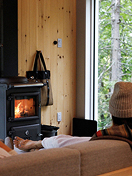
September 10, 2025
Photo
Alex Dozois and Melissa Gamache
September 10, 2025
Photo
Alex Dozois and Melissa Gamache

Baumier is on track to build the bike of the future.
It takes sheer determination to blaze some trails, while other paths emerge almost by chance: by taking the same detour again and again, our footsteps or tire treads gradually carve out a new route. Baumier founder Benjamin du Haÿs forged his own way forward somewhere between the two, after trying the direct route and then exploring scenic side roads. The visionary entrepreneur and co-founder of Mobeewave—which developed the technology behind contactless mobile phone payments such as Apple’s Tap to Pay—has long rubbed shoulders with the upper echelons of Silicon Valley. But it was time spent in nature with his children and being active outdoors that taught him to slow down and inspired him to find a different way of doing business.
Baumier is on a mission to create an ever more sustainable bicycle, piece by piece, starting with the wheels they design and make in Montréal. Soon, they’ll be making full bikes here too, powered by the collective intelligence of the Baumier team and a vision that spans time, distance, and generations.
Born in Caen, France, Benjamin du Haÿs and his partner, Élodie Latreuille, immigrated to Québec in 2007. The couple settled down and had three daughters, choosing to make this land of sharp contrasts their home. “The very first thing I bought when I got to Montréal was a bike,” du Haÿs says with a smile. “I didn’t own a car. Biking became my way into winter. It taught me to appreciate its quiet beauty, take on extreme temperatures, and ride through record snowfalls.”
A dedicated rower for over 20 years and an avid cross-country skier, du Haÿs sees exercise as both the bedrock of his life and a habit that has taught him resilience, discipline, and precision. Yet it’s cycling that has remained his mainstay, across countless projects and major moves.


After du Haÿs sold Mobeewave to Apple in 2020, feelings of exhaustion and emptiness led to some deep life questions. “I’d been spending all day every day in front of a screen,” he says, “all the while telling my kids to get off theirs.” It was a pivotal realization: du Haÿs felt a visceral need to go back to basics, to the tangible and the here and now. “I wanted my next venture to truly serve people,” he explains. “And I wanted to show my children that other ways of doing business are possible.”
And that is how Baumier saw the light of day. More than a bike brand, Baumier is a project based on people and shared values. Because bikes can bring us back to the material, to sheer effort, and to nature, and because—as far as du Haÿs is concerned—businesses can and should transform our societies for the better.
People and the environment guide every one of Baumier’s decisions. To design a bike that respects both, you have to reinvent the wheel, so to speak—overhauling the entire supply chain by focusing on local manufacturing and considering the product’s full life cycle. Riding against the wind in a trend-chasing, globalized industry, Baumier takes the slower, more sustainable path.

The doors of the Baumier workshop open onto a quiet alleyway. Along one wall hangs their four models of wheels. Bike designer Mathieu Rude and engineering student Cristiana Dumitrascu, who is completing an internship for the final year of her program, stand at a workbench, taking advantage of the natural light streaming in to examine a carbon rim they’ve just pulled out of a mould. They’ll spend the next half hour studying it from every angle.
At Baumier, nothing is left to chance. Every wheel is meticulously mounted: no assembly line, no hourly quotas, and no wasted material. They make their rims here in Montréal by braiding “dry” carbon, a technique that helps them put every gram of carbon fibre and epoxy resin to use. They select the rest of the components with just as much care, from “string” (polymer) or titanium spokes to titanium cassette bodies.
Along the garage’s east wall hangs a prototype of their next big undertaking: a bike frame. Rude is currently pouring all his time into designing bike tubes with just the right geometry. “If we know how to make a curved tube for our rims, we can figure out how to make straight ones for our frames,” he surmises with a smile. They’ll join the carbon tubes with 3D printed titanium lugs. Baumier’s locally made, sustainable, and durable frame is expected to launch in 2026.
Everything Baumier makes is built to last, proving that an alternative, more sustainable production model is not only possible—it’s also better.
Beyond a means of getting from point A to point B, a Baumier bike is a call to take it slow: to opt for the scenic route and reconnect with your body, your surroundings, your city, and nature. It’s also a stance against the breakneck pace of production in an industry obsessed with novelty, where innovation all too often goes hand in hand with obsolescence. Baumier is banking on the long term.
“We’re thinking in much longer life cycles than the rest of the bike industry,” du Haÿs explains. “Most brands change up their models every season. We want to stand behind ours for five to ten years and get more mileage out of our moulds.”
They aim to create an environmentally responsible, long-lasting, and ergonomic bike—one your body responds to intuitively, capable of reaching 20km/h with effortless strokes of the pedal. Though there will be no superfluous features—just pure, durable, high-performance mechanics—every Baumier bike will contain a lot: the team’s wealth of expertise, careful assembly from durable materials, and responsibility across every stage of its life cycle. But small-batch production and a workplace that prioritizes, not neglects, work-life balance, family, the planet, and physical activity mean higher costs. However, the payoff is company practices that truly align with its values and an organic, measured, genuinely sustainable path to growth.
Baumier isn’t just putting another bike on an already crowded market, but aiming to make the only one you’ll need.
Baumier takes its inspiration from Frederic Laloux’s idea of a “teal organization”: an organizational model that lacks a rigid hierarchy, in which decision-making processes rely on collective intelligence and input rather than personal power. Unlike Fordism, where every person is an interchangeable, replaceable link in a chain, teal organizations are inspired by the complexity of ecosystems and each individual’s inherent, unique strengths—an organizational structure based on nature, for a business deeply attuned to nature.
A core team of 10 makes Baumier what it is today. Everyone is involved in every stage of the process—workshop roles are fluid, not fixed—and driven by a shared vision to create something as meaningful as it is sustainable.
As every cyclist will tell you, biking lets you experience your surroundings in a new way, discover places you never would have otherwise, and above all, experience moments of pure bliss and the fulfilment of (powering your own self). On nice evenings, du Haÿs sets off on two wheels after dinner, doing a few laps around the F1 racetrack before heading along the Voie Maritime bike path, to ride with the river on both sides and take in the city sparkling in the distance.
“Riding calms my mind,” du Haÿs confides. “Problems fade away, or it suddenly occurs to me how to solve them. It’s as if being in motion gets your ideas moving too.”
For him, a bike isn’t a toy you store in the garage for when you have spare time. It’s an everyday companion, a tangible extension of his values, and a tool that helps him rethink his relationship to the world. Baumier makes bikes that go fast, but more importantly, that go the distance and offer us a way forward—not just by producing and consuming less, but by doing both better.












